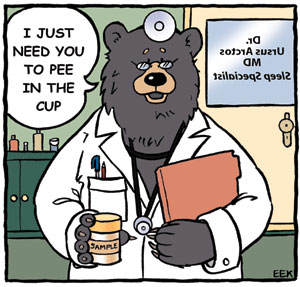Bears May Hold Secrets to Medical Mysteries
 Can astronauts on long space voyages benefit from sleeping bears? To survive long winters, bears hibernate, or go into a deep sleep, usually for four or five months. If humans were to lie still for that long, their bones would weaken and their muscles would waste away. If scientists can figure out how hibernating bears stay strong, they could find a way to help astronauts who can’t do weight bearing exercise in the weightless environment of outer space.
Can astronauts on long space voyages benefit from sleeping bears? To survive long winters, bears hibernate, or go into a deep sleep, usually for four or five months. If humans were to lie still for that long, their bones would weaken and their muscles would waste away. If scientists can figure out how hibernating bears stay strong, they could find a way to help astronauts who can’t do weight bearing exercise in the weightless environment of outer space.
They could also help millions of people who are confined to beds or wheelchairs or suffering from diseases such as osteoporosis (the loss of bone density that comes with age). Even patients with kidney problems and heart disease could benefit from a better understanding of the bear’s unique physiology.
During hibernation, bears rarely defecate or urinate. Such a build-up of urea would cause humans to die, but bears have the unique ability to convert urea back into the building blocks of protein. Just how bears do this is a mystery that scientists think may be solved in the near future. The answers may help humans who need to use kidney dialysis machines.
Surprisingly, when bears hibernate, their heart muscles take on very similar characteristics to certain forms of human heart disease. Yet in the spring, bears’ hearts quickly recover to normal activity. Through further study, scientists hope to learn more of how bears work their magic and what might help humans recover from heart disease.
Just as exciting is another recent discovery. During hibernation, a bear’s metabolism slows down by half, its heart rate drops from fifty beats per minute to ten beats per minute, and its body temperature drops by 3° to 7°C (5° to 13°F). Scientists have learned that there is a substance responsible for these metabolic adjustments in bears as well as other deep hibernators. They think that the substance may have applications in human medicine-in particular, the survival of organs for transplantation surgery. At present, 15 to 20 percent of all human donor organs have to be discarded as a result of deterioration. Any method that prolongs organ survival means that more transplants can occur and more lives can be saved.
Scientists are even researching the possibilities that the substance that makes animals hibernate (Hibernation Induction Trigger or HIT) may have applications in the treatment of insomnia, obesity and anorexia nervosa. Cancer and viral infections, like the common cold, have also responded well to HIT. [Dr. Wayne Lynch]








